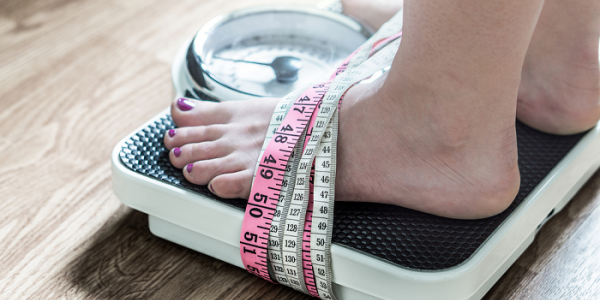Why Not Diet?

Dieting is glamorized and normalized. Weight loss is portrayed as harmless, even helpful. In this article, I make the case for not dieting. Yet, you may be left with the dilemma: If not dieting, then what? There’s help for that. Read on…
As I support people in learning how to take care of themselves with food, I’m often asked what to do about weight. Can I just say “nothing” and be done with it? Probably not.
Well then, let's start with a story:
Janet and Kathy were having coffee together, a nice break from their busy days. Janet was telling Kathy about taking care of her sick mother-in-law, Louise. It seems that Janet took really good care of Louise. Janet came running at the first ding of her mother-in-law’s bell and catered to her every need. But all Louise did was complain, never saying a word of thanks to Janet. Janet poured out her frustrations to Kathy. “Why do you do it, Janet?” asked Kathy. “Don’t you just want to quit?”
Janet’s story made me think. Her unappreciative mother-in-law’s complaints despite the excellent care Janet provided pretty much captures the relationship that many of us have with our bodies. When you stop to think about it, our bodies do a lot for us, but mostly we complain about our bodies. We point out our bodies’ flaws and imperfections, and even call our bodies disparaging names. We seldom offer gratitude for everything our bodies do for us. You would think our bodies would take Kathy’s advice and quit.
How could this happen, this strong dislike for well-functioning bodies? Legs that spring into action at the mere thought of moving. Arms that reach out and give hugs. Hips that carry children and bags of groceries.
The disdain many of us feel may be less surprising if you take a moment to consider the big budgets of the beauty and weight loss industries. They spend billions of dollars annually on marketing and advertising. Their goal? To help us find and fix our flaws. To convince us that the first step in taking care of ourselves is to berate our bodies.
But hating ourselves healthy is not only a difficult and sad way to live, it's also really unlikely to work. After all, we're less likely to take care of the things we hate than the things we love.
Have you ever heard someone say this, or maybe thought it yourself? “If only I could lose weight, I would feel so much better about myself.” But it doesn't turn out that way. People who lose weight have about the same feelings about their bodies as they had before the weight loss. Sometimes worse. How could this be? While the reasons for this phenomenon aren’t clear, I wonder if it’s the constant battle. Losing weight is hard enough. Keeping it off is miserable and constantly stressful. When you’re dieting, it’s hard to see anything in a positive light—especially your body which seems to be battling you and keeping you from reaching the goal weight that's so important to you.
Well, if it seems like you and your body against the world, I really can't disagree. We're constantly bombarded with messages telling us that having a high body weight is not okay, that losing weight is the ticket to health and happiness. The messages come at us from all angles. Some from people who can't stop talking about their latest diet. Maybe they want us to be in their boat, or share their misery.
Then there are the thin people, some who seem to have a sense of superiority and make assumptions about people who aren’t like them. After all, they may think, it’s not hard to be thin if you just eat like I do. As Barry Switzer put it, “Some people are born on third base and go through life thinking they hit a triple.”
The most convincing messages come from those with a professional investment such as people in the weight loss industry. One former executive of a major weight loss company revealed that repeat customers are a crucial part of the business plan. Well then, to meet that criteria, the diet industry has a perfect business plan.
Obesity researchers also have a professional investment. There's a lot of grant money to be had for those who study obesity and test weight loss methods. Their message is furthered by well-intentioned health professionals who promote the in-the-interest-of-better-health message. Their underlying theme is “you just haven’t tried hard enough.”
I want to provide you with an even more convincing message, a case for not buying into what those in the weight loss industry have to offer. While I don't have a billion-dollar budget, I do have access to the literature where the evidence lives. Of the many reasons not to diet, I've distilled it down to the top five.
The Top 5 Reasons to Ditch Diets
5. Your genes are in charge. Genetics determines your natural body build. Did you know that all of your physical features including weight are programmed into your DNA? Studies of identical twins tell us that body weight is primarily determined by genetics, to about the same extent as height. Identical twins separated during infancy had adult weights much more similar to each other than to the weights of their adoptive family members. In all likelihood, your body size and shape are similar to that of your blood relatives.
Your body wants to be stable. And it likely will be stable at your natural, genetically-determined weight with only a slight and gradual increase over the decades of your life. But if you or your relatives dieted, all bets are off. It's hard if not impossible to know the natural weight of someone who has dieted.
4. Dieting leads to weight gain. Intentionally losing weight almost always makes weight higher than nature intended. That's right, higher. People whose food intake is restricted eventually respond to the physiological effects of under-eating, and regain the weight they lost. Weight often goes to a higher level than when they started to restrict. The body establishes a new set point preference for that higher weight. Set point weight is like a ratchet wrench—it only goes one way. In study after rigorous study, dieting was related to weight re-gain in all but three out of every 100 study subjects.
Not only do dieters regain the weight they lost, many keep gaining until their weight is higher than when they started the diet. Studies vary in just how many end up at a higher weight—somewhere between one-third and two-thirds—maybe more. The body stocks up, it seems, for the next diet famine. It's a survival mechanism, really. And it cannot be overridden. Even worse, the more attempts at losing, the higher the weight goes.
Maybe you’ve heard of yo-yo dieting. While it sounds harmless, it's not. Yo-yo dieters are not as healthy as non-dieters. Researchers think it’s not because of the higher weight that evolves. Rather they put the blame on the damaging effects of stress on the body by the cycles of weight loss and regain.
3. Dieting damages metabolism. Metabolism is the sum total of the energy it takes to run all the engines in your body: the energy to pump your heart, fill your lungs, maintain your body temperature, and flex your muscles.
When people diet, they cut back on their calories by eating less than they ordinarily would. After initially dipping into the body’s stored energy bank of fat and muscle, the body adapts to the lower calorie intake by running some engines very efficiently while not running other engines at all. So just fuel up again after the diet ends and crank up the engines, right?
Not so, says Kevin D. Hall of the National Institutes of Health. In an interview with Scientific American, he explained, "There used to be a mythology that if you just exercised enough you could keep your metabolism up, but that clearly wasn't the case, these folks were exercising an enormous amount and their metabolism was slowing by several hundred calories per day."
“These folks” Dr. Hall referred to were former contestants on The Biggest Loser TV show, a reality show where people competed for big cash rewards to see who could lose the most weight. Dr. Hall led a team of researchers in studying 14 former contestants from Season 8 of the show. Metabolic rate of study participants was measured after the show ended, and then the measurements were repeated periodically for six years. Their metabolisms didn’t speed up again, not even when they gained weight. On average, the study participants needed 500 Calories less than predicted for someone their size.
2. Weight does not determine health or longevity. Shouldn't people with high body weight keep trying to lose for the sake of better health and longer life? There are two incorrect assumptions behind this question:
- One assumption is that everyone at high body weight is not healthy. Yet many people with high body weight are healthy. And many people with low or normal weight have health problems. In other words, weight is not a proxy for health.
- The second assumption is that weight loss will improve health. Well, now you know that weight loss diets don’t work long-term. You also know that dieting is associated with poor health.
So the answer is no. People with high body weight should not keep trying to lose weight. Nevertheless many people—including scientists—are reluctant to let go of the erroneous belief that dieting is safe and improves health.
Some scientists believe that high body weight causes disease; they say that any amount of weight loss for any amount of time is helpful. Other scientists know that people of all shapes and sizes get diseases while others remain healthy. Research comparing what happens to people of high, medium, and low weights with the same disease found better outcomes associated with high body weight. The studies have dubbed this unexpected relationship "the obesity paradox."
In terms of longevity, Centers for Disease Control and Prevention epidemiologist, Dr. Katherine Flegal, was the lead author on two very large studies that included hundreds of thousands of people. She and her team were looking at body weight and mortality. What they found was quite remarkable. People whose weight for height measurements put them in the overweight or moderately obese BMI categories had a lower risk of early death than those in the BMI normal category.The highest risk of early death was for the people in the underweight BMI category and those in the highest BMI category.
If you want better health during that long life, eating competently and being physically active are your best bets. No matter what weight, people who take care of themselves with food and are active on a regular basis doing things they enjoy – like walking, hiking, running, bicycling, playing outside, gardening, and more – have better health.
And now for reason number 1. You refuse to be duped. The information in reasons 5 through 2 has been around for years. Study after study has demonstrated the same thing: genetics is the single biggest contributor to our weight, dieting doesn’t work and is strongly associated with harm, and high body weight is not as dangerous as we have been led to believe. Health policy makers and big businesses know about genetics and these studies, and they know that dieting doesn't work.
What weight loss businesses don't want to admit is that framing high body weight as a source of health problems and a shortened lifespan does a lot of harm. Damage to physical health from weight cycling. Disinterest in self-care that comes from body dissatisfaction. Harm to well-being from the soul-killing pursuit of weight loss. And I haven’t yet mentioned the ravages of eating disorder and extreme weight loss methods. It seems to me that weight loss dieting is one of the greatest threats to health and longevity.
Unethical and uninformed people are trying to convince you that your body is “the problem,” and trying to sell you on a way to “fix” it. They’re promoting a product that is defective, even dangerous, and profiting big time at your expense. But for them, it’s business as usual.
Hot off the press is this Huffington Post article: Everything You Know About Obesity Is Wrong that supports my reason number 1.
If not dieting, then what?
To keep from getting caught in the weight dilemma, work with your body rather than against it. Set aside weight as an indicator of health, or anything really. You can trust your body to weigh what it needs to weigh.
Remember Janet, Kathy, and Louise? Rather than treat your body badly like Louise treated Janet, consider treating your body with kindness, gratitude, and respect.
Strive for a routine in eating foods you enjoy in quantities that are satisfying. This is an important step in developing and maintaining a good relationship with food. You can develop an attitude of joy in eating, a belief that all foods are fine, an intuitive sense for what and how much to eat, and a respect for your body ensuring that you will feed yourself faithfully.
Health4U is offering a series that will help you recover from the dieting mentality and learn how to eat normally. The course is aptly named How to Eat. Because recovering from dieting, and skill-building with food and eating is a process, the How to Eat course spans over 6 weeks. The orientation session is highly recommended. It’s a chance for you to learn more and ask questions before enrolling in the course. Please click here to sign-up for the orientation session.
Related Articles

Kids don't need to diet. Ever.
How to protect your children from food and body shame. And from the harmful practices of diet-leader.

Diet Talk Carries On
Talking to kids about diet or about weight...it may seem like a good idea, and may even be the advice from a reliable source. While well-meaning, encouragement to diet passed along from parent to child can have unintended and lasting consequences.

Shrinking Ideas about Diets
Start the New Year by losing the dieting mentality.





